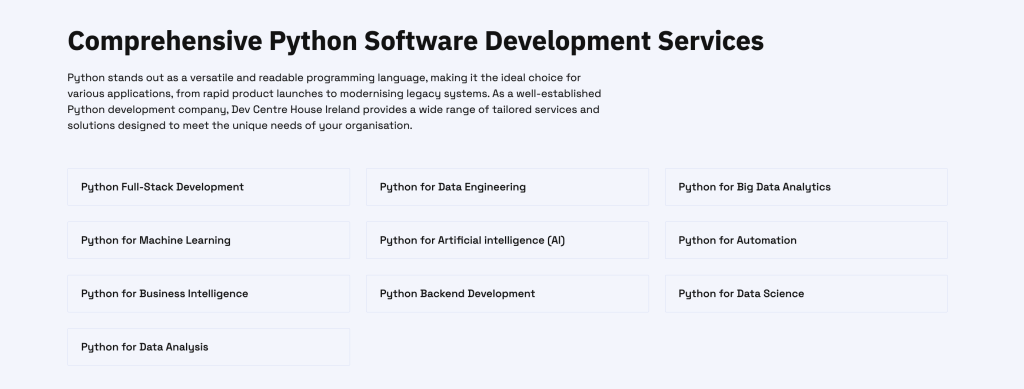Python has established itself as the dominant programming language in data science, powering everything from predictive analytics to artificial intelligence. Its simplicity, versatility, and robust libraries make it the top choice for building powerful data-driven applications. In this article, we explore some of the best data science projects built using Python and how they have transformed industries.
1. Predictive Analytics for Healthcare

One of the most impactful data science projects built using Python is in the field of healthcare. Hospitals and medical researchers leverage Python-based models to predict diseases, optimise treatment plans, and enhance patient care. Libraries like scikit-learn and TensorFlow enable data scientists to build machine learning models that can detect diseases like cancer at an early stage.
For instance, machine learning models trained on large datasets of medical images have significantly improved diagnostic accuracy. Python’s powerful data visualisation libraries, such as Matplotlib and Seaborn, allow for easy interpretation of complex medical data.
2. Fraud Detection in Financial Services

The finance sector has seen massive improvements in fraud detection, thanks to data science projects using Python. Banks and financial institutions use machine learning algorithms to detect unusual transaction patterns and prevent fraud in real time.
Python’s Pandas and NumPy libraries help in processing vast amounts of financial data, while Scikit-learn and XGBoost assist in building classification models to identify fraudulent transactions. These projects have saved companies millions by reducing fraudulent activities and enhancing cybersecurity.
3. Customer Recommendation Systems

E-commerce platforms and streaming services rely on Python-powered recommendation systems to personalise user experiences. Companies like Netflix, Amazon, and Spotify use data science projects built using Python to suggest content and products based on user preferences.
These recommendation engines utilise collaborative filtering and deep learning algorithms, implemented using PyTorch and TensorFlow, to analyse user behaviour. The ability to process large datasets quickly allows businesses to provide real-time recommendations, improving customer satisfaction and engagement.
4. Autonomous Vehicles and Traffic Prediction
Python is at the core of self-driving car technology, where data science meets artificial intelligence. Companies like Tesla and Waymo utilise Python-based deep learning frameworks to train models that detect objects, recognise traffic signs, and predict pedestrian movement.
Additionally, Python-based traffic prediction models use historical data to forecast congestion patterns and suggest optimal routes. Libraries like OpenCV, NumPy, and Pandas enable data scientists to process real-time data from sensors and cameras, making autonomous navigation safer and more efficient.
5. Sentiment Analysis and NLP-Based Chatbots
Businesses use sentiment analysis to understand customer feedback and improve their services. Python’s Natural Language Toolkit (NLTK) and spaCy allow for text processing and sentiment classification, helping companies gauge public opinion on their products.
Similarly, Python-based chatbots and virtual assistants enhance customer interactions by using NLP techniques to understand and respond to queries. Brands like Facebook and Google use Python-powered chatbots to provide automated customer support, significantly reducing response times.
6. Climate Change and Environmental Monitoring
Python plays a critical role in analysing climate data to study environmental changes. Researchers use data science projects built using Python to predict temperature fluctuations, monitor pollution levels, and model climate trends.
By leveraging Geopandas, Matplotlib, and SciPy, scientists process vast datasets from satellites and sensors to provide real-time insights into climate change. These projects contribute to global sustainability efforts by informing policies and conservation strategies.
7. Sports Analytics for Performance Optimisation
Python-driven sports analytics has revolutionised the way teams and athletes optimise performance. Using data collected from player movements, in-game statistics, and wearable sensors, Python-based models predict match outcomes, identify injury risks, and improve game strategies.
Teams in leagues such as the Premier League and NBA employ Python’s Pandas and Scikit-learn to analyse player efficiency, helping coaches make data-driven decisions. The growing influence of sports analytics has transformed competitive sports, making training and strategy development more precise.
How Dev Centre House Ireland Supports Python-Based Data Science Projects
For businesses looking to leverage Python for data science, Dev Centre House Ireland offers expert solutions in building scalable, high-performance applications. Their team specialises in Python development, providing end-to-end services for startups and enterprises aiming to integrate data-driven decision-making into their operations.
From predictive modelling to AI-powered analytics, Dev Centre House Ireland ensures that businesses harness the full potential of Python for innovation and efficiency.

Python continues to be the driving force behind some of the most innovative data science projects across various industries. Whether it’s healthcare, finance, e-commerce, or environmental research, Python’s vast ecosystem of libraries and frameworks makes it the go-to choice for data-driven solutions.
If you’re looking to build a cutting-edge data science project using Python, partnering with experienced professionals like Dev Centre House Ireland can help you achieve your goals efficiently.



